Related Research Articles

Chubby Checker is an American rock and roll singer and dancer. He is widely known for popularizing many dance styles, including the Twist dance style, with his 1960 hit cover of Hank Ballard & The Midnighters' R&B song "The Twist", and the Pony dance style with the 1961 cover of the song "Pony Time". His biggest UK hit, "Let's Twist Again", was released one year later ; that year, he also popularized the song "Limbo Rock", originally a previous-year instrumental hit by the Champs to which he added lyrics, and its trademark Limbo dance, as well as other dance styles such as The Fly. In September 2008, "The Twist" topped Billboard's list of the most popular singles to have appeared in the Hot 100 since its debut in 1960, an honor it maintained for an August 2013 update of the list.
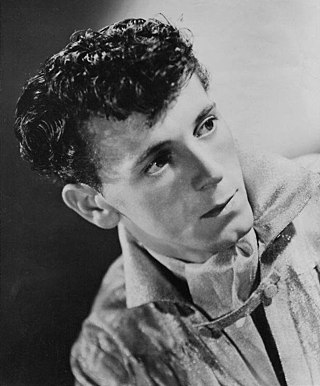
Vincent Eugene Craddock, known as Gene Vincent, was an American musician who pioneered the styles of rockabilly and rock and roll. His 1956 top ten hit with his backing band the Blue Caps, "Be-Bop-a-Lula", is considered a significant early example of rockabilly. His chart career was brief, especially in his home country of the US, where he notched three top 40 hits in 1956 and '57, and never charted in the top 100 again. In the UK, he was a somewhat bigger star, racking up eight top 40 hits from 1956 to 1961.
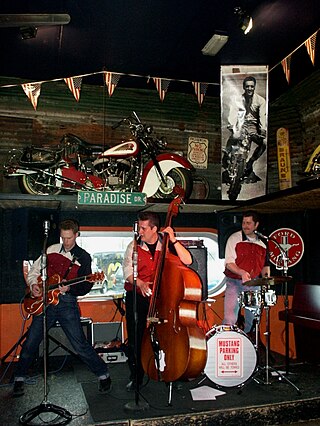
Rockabilly is an early style of rock and roll music. It dates back to the early 1950s in the United States, especially the South. As a genre it blends the sound of Western musical styles such as country with that of rhythm and blues, leading to what is considered "classic" rock and roll. Some have also described it as a blend of bluegrass with rock and roll. The term "rockabilly" itself is a portmanteau of "rock" and "hillbilly", the latter a reference to country music that contributed strongly to the style. Other important influences on rockabilly include western swing, boogie-woogie, jump blues, and electric blues.

American Bandstand, abbreviated AB, is an American music-performance and dance television program that aired regularly in various versions from 1952 to 1989, and was hosted from 1956 until its final season by Dick Clark, who also served as the program's producer. It featured teenagers dancing to Top 40 music introduced by Clark; at least one popular musical act—over the decades, running the gamut from Jerry Lee Lewis to Run–D.M.C.—usually appeared in person to lip-sync one of their latest singles. Artists would sing naturally to the studio audience over a background of their own disc, while viewers at home would hear only the original recording. Freddy Cannon holds the record for most appearances, at 110.
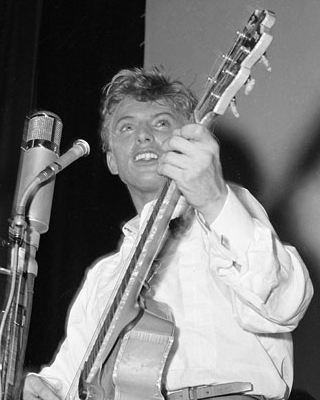
Sir Thomas Hicks, known professionally as Tommy Steele, is an English entertainer, regarded as Britain's first teen idol and rock and roll star.
Cameo-Parkway Records was the parent company of Cameo Records and Parkway Records, which were major American Philadelphia-based record labels from 1956 and 1958 to 1967. Among the types of music released were doo-wop, dance hits, popular/rock, rockabilly, big band, garage rock, soul and novelty records.

Buddy Wayne Knox was an American singer and songwriter, best known for his 1957 rock hit song, "Party Doll".

Charles Anthony Graci, known professionally as Charlie Gracie, was an American rock and roll and rhythm and blues singer and guitarist. His biggest hits were "Butterfly" and "Fabulous", both in 1957.

Marshall Edward Lytle was an American rock and roll bassist, best known for his work with the groups Bill Haley & His Comets and The Jodimars in the 1950s. He played upright slap bass on the iconic 1950s rock and roll records "Crazy Man, Crazy", "Shake, Rattle and Roll", and "Rock Around the Clock".

Warren Smith was an American rockabilly and country music singer and guitarist.

Billy Wayne "Crash" Craddock is an American country and rockabilly singer. He first gained popularity in Australia in the 1950s with a string of rockabilly hits, including the Australian number one hits "Boom Boom Baby" and "One Last Kiss" in 1960 and 1961 respectively. Switching to country music, he gained popularity in the United States in the 1970s with a string of top ten country hits, several of which were number one hits, including "Rub It In", "Broken Down in Tiny Pieces", and "Ruby Baby". Craddock is known to his fans as "The King Of Country Rock Music" and "Mr. Country Rock" for his uptempo rock-influenced style of country music.

"Be-Bop-a-Lula" is a rockabilly song first recorded in 1956 by Gene Vincent and His Blue Caps.
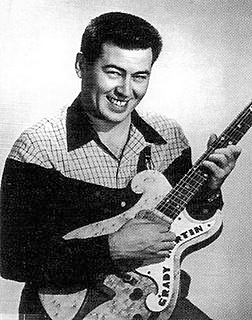
Thomas Grady Martin was an American session guitarist in country music and rockabilly.

Ralph Joseph "Jody" Reynolds was an American rock and roll singer, guitarist, and songwriter whose song "Endless Sleep" was a major U.S. top-ten hit in the summer of 1958. His follow-up single, "Fire of Love", peaked at only No. 66 on the Billboard chart, but the song went on to become a blues-punk classic after being covered by the MC5 and the Gun Club.
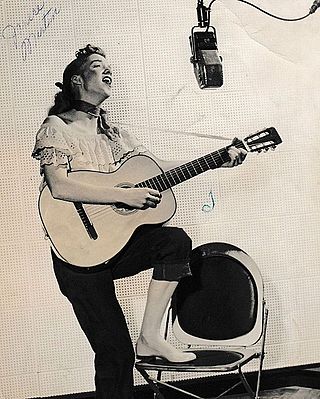
Janis Darlene Martin was an American rockabilly and country music singer. She was one of the few women working in the male-dominated rock and roll music field during the 1950s and one of country music's early female innovators. Martin was nicknamed the Female Elvis for her dance moves on stage, similar to those of Elvis Presley.
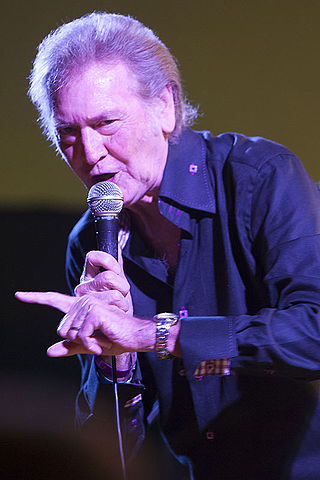
David Eugene Summers was an American rockabilly singer, songwriter and guitarist. His most famous recordings include the late 50s "School of Rock 'n Roll", "Straight Skirt", "Nervous", "Gotta Lotta That", "Twixteen", "Alabama Shake", "Fancy Dan" and his biggest-selling single "Big Blue Diamonds". Summers was inducted into the Rockabilly Hall of Fame in 1997 and the Southern Legends Entertainment & Performing Arts Hall of Fame in 2005. He still performed worldwide and celebrated his 50th anniversary as a recording artist in 2008 with the release of Reminisce Cafe.
The Sparkletones were an American rock and roll/rockabilly group from Spartanburg, South Carolina, United States.
This article includes an overview of the major events and trends in popular music in the 1950s.
George Rodrick Jackson was an American rockabilly and rock and roll singer, songwriter, pianist and saxophonist, who recorded for Specialty Records in the 1950s.

"Fujiyama Mama" is a song written by Jack Hammer. It was first recorded in 1955 by Annisteen Allen, and in 1957 by rockabilly singer Wanda Jackson, both for Capitol. It did not chart in the United States, but Jackson's recording became a No. 1 hit in Japan for several months in 1958.
References
- ↑ Bill Millar (2000). "Wayne Handy". In That'll Flat Git It Vol. 9 (pp. 11-12) [CD booklet]. Hambergen, Germany: Bear Family Records